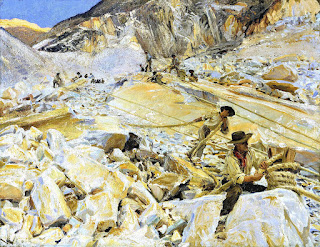Pisa was Edward Hutton's favorite city in Tuscany. In this chapter he devoted almost thirty pages to its long and tragic history, but it is his description of the city itself that stands out.
To enter Pisa by the Porta Nuova, coming at once into the Piazza del Duomo, is as though on midday, on the highway, one had turned aside into a secret meadow full of a strange silence and dazzling light, where have been abandoned among the wildflowers the statues of the gods. For the Piazza is just that—a meadow scattered with daisies, among which, as though forgotten, stand unbroken a Cathedral, a Baptistry, a Tower, and a Cemetery, all of marble, separate and yet one in the consummate beauty of their grouping. And as though weary of the silence and the light, the tower has leaned towards the flowers, which may fade and pass away. …
Wherever you may be in Pisa, you cannot escape from the mysterious influence of these marvellous ghosts that haunt the verge of the city, that corner apart where the wind is white on the grass, and the shadows steal slowly through the day. The life of the world is far away on the other side of the city; here is only beauty and peace. (77)…
But for me, of all the cities that grow among the flowers in Tuscany, it is Pisa that I love best. She is full of the sun; she has the gift of silence. Her story is splendid, unfortunate, and bitter, and moves to the song of the sea; still she kept her old ways about her, the life of to-day has not troubled her at all. In her palaces the great mirrors are still filled with the ghosts of the eighteenth century; on her Lung’Arno you may almost see Byron drive by to mount his horse at the gate, while in the Pineta, not far away, Shelley lies at noonday writing verses to Miranda. (105)
Lung’Arno
Standing there (Ponte di Mezzo) you may see the yellow river, curved like a bow, pass through the beautiful city, between the palaces of marble, their wrinkled image reflected in the stream, til it is lost in the green fields on its way to the sea; while on the other side, looking eastward, on either side the river are the palaces of Byron and Shelley, just before the hideous iron bridge, where Arno turns suddenly into the city from the plain and the hills. (106)…
It is of course to the wonderful group of buildings to the north of the city, just within the walls, that every traveller will first make his way. Passing from Ponte di Mezzo down the Lung’ Arno Regio…you turn at last into the Via S. Maria, a beautiful and lovely street that winds like a stream full of shadows to the Piazza del Duomo. (107)
Coming as one does out from this narrow deserted street of S. Maria into the space and breadth of the Piazza del Duomo, one is almost blinded by the sudden light and glory of the sun on those buildings, that seem to be made of old ivory intricately carved and infinitely noble. Standing there as though left stranded on some shore that life has long deserted, they are an everlasting witness to the Latin genius, symbols as it were of what has had to be given up so that we may follow life at the heels of the barbarian Teuton. (108)
###
Edward Hutton: Florence and Northern Tuscany with Genoa, second edition, London, 1908. Pp. 77-108.








